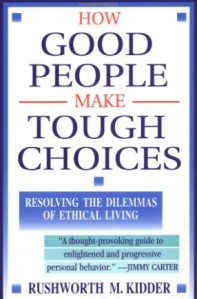adopted from Rushworth Kidder

I. Recognize that there is a moral issue, determine the actors, and gather the relevant facts
II. Test for right vs. wrong issues – these are easier than III. because there is usually a more obvious (right) answer
- Stench test (rules-based) – Does one option just sound wrong or leave you feeling like you are breaking a rule?
- Front Page test (ends-based) – Are you OK with the decision you made being on all major news websites?
- Mom test (care-based) – Will your mother (and/or father) approve of the decision you made?
III. Test for right vs. right paradigms – these are decisions where two competing, an often equally valid, views are held. Integrate the “The Genius of the And”, not “The Tyranny of the Or” in finding solutions. Some of them are listed below:
- Justice vs. Mercy
- Example – Death vs. Life Sentence
- Freedom vs. Responsibility
- Example – Free to carry gun, use pot, but don’t hurt others
- Truth vs. Loyalty
- Example – Lies used to save lives in WWII Germany
- Continuity vs. Change
- Example – Stick to Constitution, or adapt to current times
- Short-term vs. Long-term
- Example – Drive fast – on time vs. drive safe – live longer
- Individuals vs. Community
- Example – Lower taxes vs. better schools, roads, etc.
IV. Apply the 3 forms of resolving dilemmas to the decision and identify the line of reasoning that seems most relevant and persuasive to the issue
a. Ends-based thinking – Utilitarianism – Seek the Greatest Good for the Greatest Number – Example – Drop the atomic bomb on Japan because hundreds of thousands more will die if don’t?
b. Rules-based thinking – Universalizability – Follow the Principle We Want Everyone Else to Follow – Example – Is it ever OK to help someone die? Can you steal medicine to save a life?
c. Care-based thinking – Reversibility or Golden Rule – Do to Others What We Would Like Them to Do to Us – Example – Do non-violent offenders need to be in prison for long sentences?
V. Make the decision, then Revisit and Reflect on the Decision
